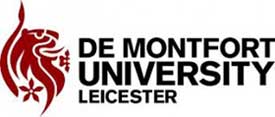Music & Dance courses
De Montfort University

- UK
- World Rank : 601
- Visit Website
On the Creative Music Technology BA you will focus on composition and production. With us, you will explore an extensive range of approaches to creating and performing, including studio-based composition, multi-track recording and production, and sound synthesis.
Discover the application of music across disciplines, from music and sound for film to site-specific and installation work, creative computer coding, and advanced surround sound and diffusion.
Allow your vision and voice to be inspired by the academic study of digital and post-digital history and aesthetics. Based on your own interests, you will have the freedom to choose compositional, technical and theoretical topics to research in greater depth. You will have access to our dedicated facilities where you can explore areas such as spatialisation, musical computing and sound recording.
This course is taught by internationally recognised, experienced musicians who are active performers, composers and researchers at the forefront of electronic and electroacoustic music, electronica and sonic art.
Our graduates have gone on to work as composers, sound designers, performing and recording artists, session musicians, recording engineers, producers and audio technicians, in major organisations such as the BBC, ITV, Sony Music, Warner Music Group and smaller genre-based labels Ninja Tune and K7.
Key features
English language
If English is not your first language then an IELTS score of 6.0 overall with a minimum of 5.5 in each component (or equivalent) is essential.
| Type of Institution | Public |
| Campus Setting | Urban |
| Endowment | £1.17 million |
| Number of Campuses | 4 faculties |
| Number/Percentage of International Students | 23205 |
| Total number of Professors | 3240 |
| Student Satisfaction Rate | 86% |
| Graduate Job Rate | 97.3% |
| Number of Residence Vacancy | Around 3000 |
| International fee | Undergraduates- £13240 (annual) Postgraduates- £15950 (annual) |
| Number of Academic Programs | UG, PG, Part time, distance, blended |
| Mode of Program | Full time, distance and online |
| Average Graduate Salary | 19800 pounds a year |
| Field of Study | Avg.Fees |
|---|---|
| Art, Design and Humanities: | £13,750 |
| Business and Law | £13,750-£14,550 |
| Media | £13,750 - £14,250 |
| Engineering | £14,250 |
| Computing | £14,250 |
| Health and Life Sciences | £13,250 - £14,250 |
| Nursing BSc | £14,950 |
| Expenses | Estimated cost in pounds |
|---|---|
| Undergraduate tuition fee | 13,250- 14950 |
| Postgraduate tuition fee | 13600-15,900 |
| On campus accommodation | 5,000-6040 |
| Average cost of living | 97-110 per week |
DMU International Scholarship up to 1500 pounds
| Tuition Fees in UK (1st Year Average) | MS: £17276 | MBA: £17276 | BE/Btech: £16632 | BBA: £15130 | BSc: £16632 | MFin: £19000 | MA: £15560 | MIM: £18241 | MEM: £16950 | MArch: £14271 | BHM: £12662 | MIS: £15344 | MEng: £12876 | MBBS: £28865| MPharm: £15452 |
| Average Accomodation & Food Costs in UK | £850 to £1,050 a month |
| Entrance Exams in UK | TOEFL: 88 | IELTS: 6.5 | PTE: 59 | GMAT: 590 |
| Work and Study in UK | Permitted for 20 hours/week with a valid study permit. |
| Post Study Work Permit in UK | 2 Year after graduation depending on the course. |
| Cost of Student Visa in UK | £348 |
| Student Visa in UK | Your nationality, duration of your stay and purpose of your stay are the three essential factors for UK visa. For Non-EU students UK visa is mandatory. |
| Intakes in UK | There are mainly two intakes in UK: January/February & September/October. |
| Top Job Sectors in UK | IT Engineering, Product Design, Mobile Development, Designers, Logistics, etc. |
| Economy in UK | Growth Rate: 1.3% (2018) 1.4% (2019) 1.4% (2020e), 6th Largest Economy in the World by Nominal |
Tuition & fees :
£ 14,750
Hostel & Meals :
£ 6,063
Total
£ 20,813